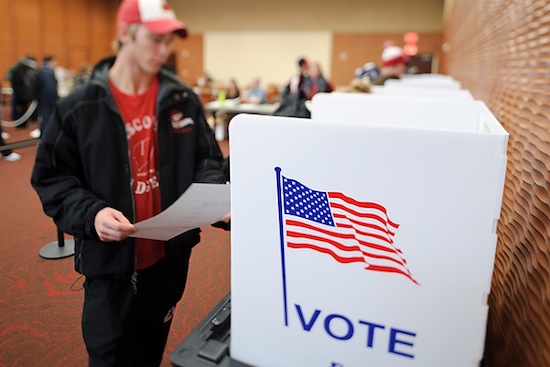But It’s Unknown What Biden Is Doing to Secure the 2022 and 2024 Elections from Russian Interference
In the wake of the recent Colonial Pipeline and SolarWinds hacks, President Joe Biden signed an executive order Wednesday to improve cybersecurity and protect federal government networks.
A senior Biden administration official said that the order “reflects a fundamental shift in our mindset from incident response to prevention, from talking about security to doing security.”
This is a necessary response in the face of increasingly sophisticated malicious cyber activity from both nation-state actors and cybercriminals, but it’s only a first step.
In discussing recent cyber activity, the focus has been on Russian actors. While there is no evidence linking the Russian government to the pipeline attack, little happens among Russian criminal networks without Russian President Vladimir Putin knowing.
Biden has suggested that Russia bears some responsibility for the attack because it was linked to cybercriminals with ties to Russia.
As we grapple with the challenge of catching up on cybersecurity, the risk is that the ongoing threat to the security of our elections is overshadowed.
Speaking of Russian attacks and security, what about election security? Critical election security in the face of ongoing Russian election interference is at risk of being overshadowed by the overwhelming need to launch numerous cybersecurity efforts.
DCReport sought an update from the Office of Director of National Intelligence (ODNI) on how election security—ignored in the lead-up to the 2020 election—was being handled in the Biden era. ODNI oversees all 17 agencies that make up the U.S. Intelligence Community—from Air Force Intelligence to the FBI to the new Space Force Intelligence unit.
‘Top Priority’
“U.S. election security is a top priority for the Intelligence Community as we look to future election cycles,” said an ODNI spokesperson. “More broadly, foreign malign influence activities not only threaten our elections, but they also aim to exacerbate divisions and sow discord across the United States.”
As the recent SolarWinds breach of government operations and the Colonial Pipeline hack have exposed, cybersecurity is one of the looming threats that has to shift from an afterthought to a top federal priority. As early as January 2021, Biden’s new Director of National Intelligence Avril Haines emphasized the need for a coordinated approach. ODNI is moving to create the Foreign Malign Influence Center.
“The center will be focused on coordinating and integrating intelligence pertaining to malign influence, drawing together relevant and diverse expertise to better understand and monitor the challenge,” Haines said.
The bottom line: Cybersecurity issues are critical and worthy of being foremost in the Biden administration. But, as we grapple with the challenge of catching up on cybersecurity, the risk is that the ongoing threat to the security of our elections is overshadowed. Four years after Russian Interference in 2016, we once again saw Russian interference in the 2020 election. And without escalating efforts, we face continued Russian interference in the 2022 election.
Congress Role
Creating a hub to gird against foreign influence was welcomed by Congressional leaders.
“The United States is simply not prepared to fend off state-sponsored or even criminal hackers intent on compromising our systems for profit or espionage,” said Sen. Mark R. Warner (D-Va.), chairman of the Senate Select Committee on Intelligence.
Warner called Biden’s executive order “a good first step” but insisted Congress will have to address the issues of cyber vulnerabilities.
The Foreign Malign Influence Center represents a streamlined approach to gathering intelligence that should assist the Intelligence community in getting back to its intended mission of keeping Congress informed.
Whether the Biden administration will get back to keeping the public informed is still to be determined. The Trump administration shut the loudest public voice on the issue of election security just as the 2020 presidential contest got under way.
Silencing the Czar

Back in July 2019, former Director of National Intelligence (DNI) Dan Coates appointed Shelby Pierson as the Intelligence community election threats executive (ETE)—sometimes referred to as the elections security czar—and she operated as the DNI’s principal adviser on threats to elections and matters related to election security. A two-decade career intelligence official, she worked as the national Intelligence manager for Russia, Europe and Eurasia at the Office of the Director of National Intelligence (ODNI) before becoming election czar. At first, as the 2020 election began to simmer, Pierson had a lot to say. During the first eight months in her position, Pierson was outspoken, regularly cautioning vigilance in regard to our elections. But after that a Feb. 25, 2020, interview, Pierson disappeared from public view.
On Feb. 13, 2020, Shelby Pierson, who had a reputation for plain speaking and candor, went to the Capitol to warn House lawmakers that Russia was interfering in the 2020 campaign. The Kremlin wanted to see Donald J. Trump re-elected to a second term as president, Pierson said. She told the lawmakers that Russia intended to interfere with the 2020 Democratic primaries as well as the General Election.
Trump wasn’t happy that his intelligence agencies were spilling the beans about Russia to Congress. Within days, Trump fired Pierson’s boss, the acting Director of National Intelligence Joseph Maguire, and replaced him with loyalist Richard Grenell. As DCReport previously reported, Grenell was put in place to control the Trump-Russia narrative and to undertake damage control. Shelby Pierson was part of the damage that Grenell had to get under control.
Under Grenell’s watchful eye, Pierson’s participated in her last interview , seeking to assure Americans that despite reports from the briefing, she was to remain in her position and that the vote remains secure. Pierson has not appeared in the press again or made any public statements since.
Democrats Alarmed
In July 2020, Democrats claimed the Trump election czar wasn’t telling the whole story about Russian interference. Absent in those stories were any references to Pierson herself. Instead, they discussed a briefing by Bill Evanina, director of NCSC (National Counterintelligence and Security Center), downplaying Russian interference and creating a false equivalence with China That lie has since been debunked in a recently released report by the post-Trump era Intelligence community.
By August 2020, the Office of the Director of National Intelligence (ODNI), where Shelby Pierson continued to work, canceled all election security briefings to Congress. Speaker of the House Nancy Pelosi (D-Calif.) and House Intelligence Committee Chairman Adam Schiff (D-Calif.) issued a joint statement calling the move “a shocking abdication” of the director to keep the Congress informed. “This intelligence belongs to the American people,” Pelosi and Schiff said, “not the agencies which are its custodian.
“And the American people have both the right and the need to know that another nation, Russia, is trying to help decide who their president should be.”
Last Congressional Briefing
Prior to the cancellation of briefings in August 2020, the last time House lawmakers received substantative briefings was when Shelby Pierson answered Adam Schiff’s direct question about whether Russia had a preference in the November 2020 election. Pierson replied that it did and that Russia’s preference was for Trump.
Emails released in March 2021 paint a picture of Grenell walking into his position almost immediately after Pierson’s briefing. Focusing on damage control, Grenell oversaw Pierson’s next interactions with the press, putting to bed rumors that she was about to be fired in a retaliatory move due to her candor and trying to temper the impression that the elections were under attack. That became her last interaction with the press.
Just days into taking up the new position, Grenell was cited in a New York Times article. The headline: “Richard Grenell Begins Overhauling Intelligence Office, Prompting Fears of Partisanship.”
Backroom conversations show the ODNI communications team trying to explain the story. A staff member whose name was redacted wrote: “I did confirm that the story was NOT discussed with our StratComs [Strategic Communications] team prior to release, so there was no opportunity to weigh in or shape the narrative. Again, my apologies.”
Days later, we see email discussions about another Times article, this time coordinated with Pierson and overseen by the Strategic Communications team. Grenell asks, “How did it go with Shelby and NYT?”
The response was simple “Sir, All went well.” That same day, Feb. 25, 2020, the article came out announcing that Shelby Pierson would not be fired as a consequence of her briefing and assuring the American public the elections were secure. Pierson was quoted as saying, “The priority and focus of the intelligence community on election security is unwavering and unchanged.”
Just prior to the Times story being published, another news organization contacted the Strategic Communications team saying it had a White House source saying Pierson was going to be fired that night. The team communicated with that reporter but didn’t feel that the sourcing was solid or from the White House. Grenell’s response was, “sounds like a drama queen with poor sources.”
While it’s unclear if fear of a media storm ultimately saved Pierson from being fired, the election interference narrative was controlled—to Trump’s benefit. Pierson, though silenced, remained in her position as election security czar.
DCReport attempted to speak with Shelby Pierson for an update on her current election security thoughts and her agenda leading up to 2022. The ODNI would not fulfill our request for an interview.
This vetting is not only reminiscent of the past administration, but it fits with recent reporting from Politico about a current practice undertaken by the White House of requiring quote approval. In order for reporters to quote an administration official, the Biden administration requires that quotes are sent to the communications team to approve, veto or edit them. This gives the Biden administration an extra measure of control as it tries to craft press coverage.
As Shelby Pierson herself said in one of her last interviews before that February 2020 briefing,“Transparency enables resilience. And sunlight is the best disinfectant. So, the more that we talk about the threat, potentially more we empower voters to understand this as merely a reality of today’s landscape — and that despite all of those challenges, we’re managing them or countering them.”
Featured image: Alabama Public Radio




